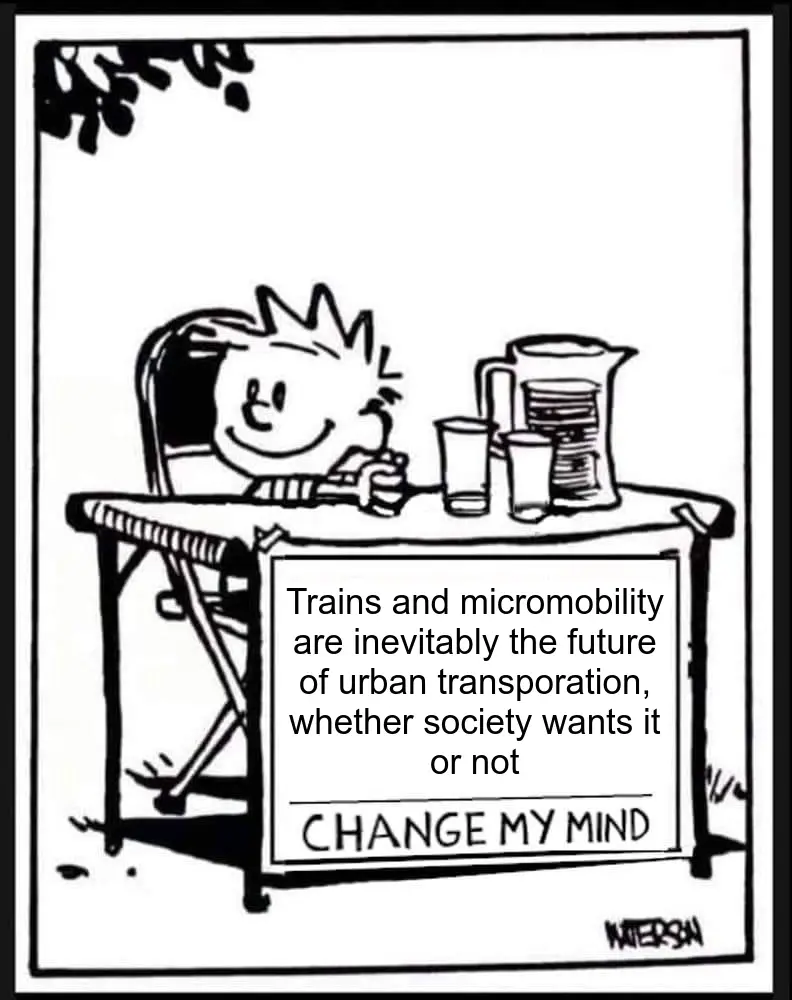Fuck Cars
A place to discuss problems of car centric infrastructure or how it hurts us all. Let's explore the bad world of Cars!
Rules
1. Be Civil
You may not agree on ideas, but please do not be needlessly rude or insulting to other people in this community.
2. No hate speech
Don't discriminate or disparage people on the basis of sex, gender, race, ethnicity, nationality, religion, or sexuality.
3. Don't harass people
Don't follow people you disagree with into multiple threads or into PMs to insult, disparage, or otherwise attack them. And certainly don't doxx any non-public figures.
4. Stay on topic
This community is about cars, their externalities in society, car-dependency, and solutions to these.
5. No reposts
Do not repost content that has already been posted in this community.
Moderator discretion will be used to judge reports with regard to the above rules.
Posting Guidelines
In the absence of a flair system on lemmy yet, let’s try to make it easier to scan through posts by type in here by using tags:
- [meta] for discussions/suggestions about this community itself
- [article] for news articles
- [blog] for any blog-style content
- [video] for video resources
- [academic] for academic studies and sources
- [discussion] for text post questions, rants, and/or discussions
- [meme] for memes
- [image] for any non-meme images
- [misc] for anything that doesn’t fall cleanly into any of the other categories
Recommended communities:
view the rest of the comments

Just to pick on one point, as a tangent, the government paying for roads with little cost to the freight carriers is a major, major problem. If the cost of transport is not factored into the cost of goods, it breaks the feedback mechanism of prices in the market affecting the supply of road transport, both per se, and in relation to other, possibly more efficient, means of transport. I came up with a reductio ad absurdum scenario to illustrate better: Imagine the government provided free air freight across oceans, without limit.
It’s pretty obvious what would happen: The logistics companies would abandon cargo ships, which cost them money, for the free air service. It would be horribly inefficient and wasteful, but that would not be their concern. We’d end up in the same situation that we are today with roads; our governments are going broke trying to pay for it. (In that world, I also imagine that people consider the service the normal baseline that they’ve structured their lives and businesses around, and can’t fathom ending it, just like roads in our world.
Anyway, passenger rail service has never been profitable. Railroads just operated passenger trains as a condition of being allowed to operate freight routes, which the government had subsidized with land giveaways. The question is whether passenger is more sustainable fiscally than roads for personal vehicles, and the survival of rail freight against massively subsidized road freight suggests that it would be. At least for longer, intercity routes.
Yes you've got a point. Part of this was an exercise to argue against something I really love and passionate about for the sake of "Change my Mind".
But that's part of the thing. If an organization paid for unlimited free air passenger and freight transport system, converting to better alternatives (on monetary cost, the environment and other bases) would be difficult to convince from people and logistics companies alike. If left alone, this sort of system would be unlikely to change until some devastating consequence made it unfeasible to switch at that point anyway. And in such a universe maybe we'd see more blimps in the sky.
So either road has to be regulated fairly and costs that were externalized get properly accounted for and renumerated, or railroad track has to be managed nationally, and provide fair access to communities large and small, in order for rail and wheeled vehicles to be on equal footing. Neither of these things I would expect to happen naturally, it must come from an organized effort somewhere.